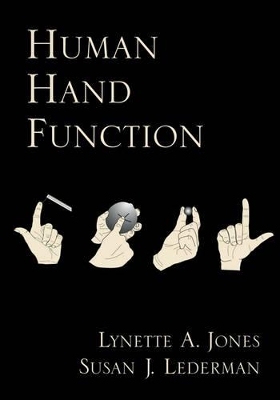
Human Hand Function
Oxford University Press Inc (Verlag)
978-0-19-517315-4 (ISBN)
Hands are miraculous tools that are used both for sensing and acting on the world. Although a great deal of research has been conducted on human hand function, there is no coherent presentation of it to guide those seeking to understand its current state. This volume surveys normal hand function in healthy individuals and presents a new conceptual framework for organising and analysing what is known about it. Jones and Lederman organise human-hand research on a continuum that ranges from activities that are essentially sensory to those with a strong motor component. They distinguish four broad categories along the continuum: tactile sensing, active haptic sensing, sensory-guided action, and non-prehensile skilled movements. These categories are used to consider critical aspects of the hand, including the sensory and motor basis of manual function, the role of different parts of the hand in perception and action, tasks the hand can perform, and the changes in manual function from birth to old age. The framework meaningfully organises a vast number of studies of hand function and identifies those areas requiring additional study. This volume is intended as a reference for researchers and clinicians in neuroscience, cognitive science, cognitive and developmental psychology, gerontology, kinesology, hand surgery and rehabilitation medicine, mechanical engineering and robotics, and computer science.
Lynette Jones is a Principal Research Scientist in the Department of Mechanical Engineering at the Massachusetts Institute of Technology (MIT) in Cambridge, Massachusetts. Her research focuses on a number of areas related to human haptic perception and motor performance. Much of this work is conducted in the context of the design of haptic interfaces that human operators use to interact with computer-generated virtual environments or to control robotic devices. It entails basic research on the human proprioceptive and tactile sensory systems that examines how various feedback systems contribute to perception. Jones' applied research on haptic interfaces involves the development of wearable tactile displays that can be used as navigation aids. Susan Lederman is Professor of Psychology, with cross-appointments in the Center for Neuroscience and the School of Computing at Queens University in Ontario, Canada. She is a Fellow of the Royal Society of Canada and holds a Queens University Research Chair. Her research contributions span a wide range of topics pertaining to sensory, perceptual, cognitive, and sensory-guided motor processing. Her particular interests include tactile psychophysics, haptic and multisensory processing of objects, their properties and spatial locations, and in addition, the sensory-guided control of grasping and manipulation. Lederman has also applied the results of her scientific research to a variety of real-world problems, including the design of haptic and multisensory interfaces for virtual environments and teleoperation.
1. Historical Overview and general introduction ; 2. Evolutionary development and anatomy of the hand ; 3. Sensory neurophysiology ; 4. Tactile sensing ; 5. Active haptic sensing ; 6. Prehension ; 7. Non-prehensile skilled movements ; 8. End-effector constraints ; 9. Hand function across the lifespan ; 10. Applications ; 11. Summary, conclusions and future directions
| Erscheint lt. Verlag | 11.5.2006 |
|---|---|
| Zusatzinfo | 8 halftones, 108 line illustrations |
| Verlagsort | New York |
| Sprache | englisch |
| Maße | 186 x 254 mm |
| Gewicht | 699 g |
| Themenwelt | Geisteswissenschaften ► Psychologie ► Biopsychologie / Neurowissenschaften |
| Medizin / Pharmazie ► Physiotherapie / Ergotherapie ► Rehabilitation | |
| Naturwissenschaften ► Biologie ► Humanbiologie | |
| Naturwissenschaften ► Biologie ► Zoologie | |
| ISBN-10 | 0-19-517315-5 / 0195173155 |
| ISBN-13 | 978-0-19-517315-4 / 9780195173154 |
| Zustand | Neuware |
| Informationen gemäß Produktsicherheitsverordnung (GPSR) | |
| Haben Sie eine Frage zum Produkt? |
aus dem Bereich


